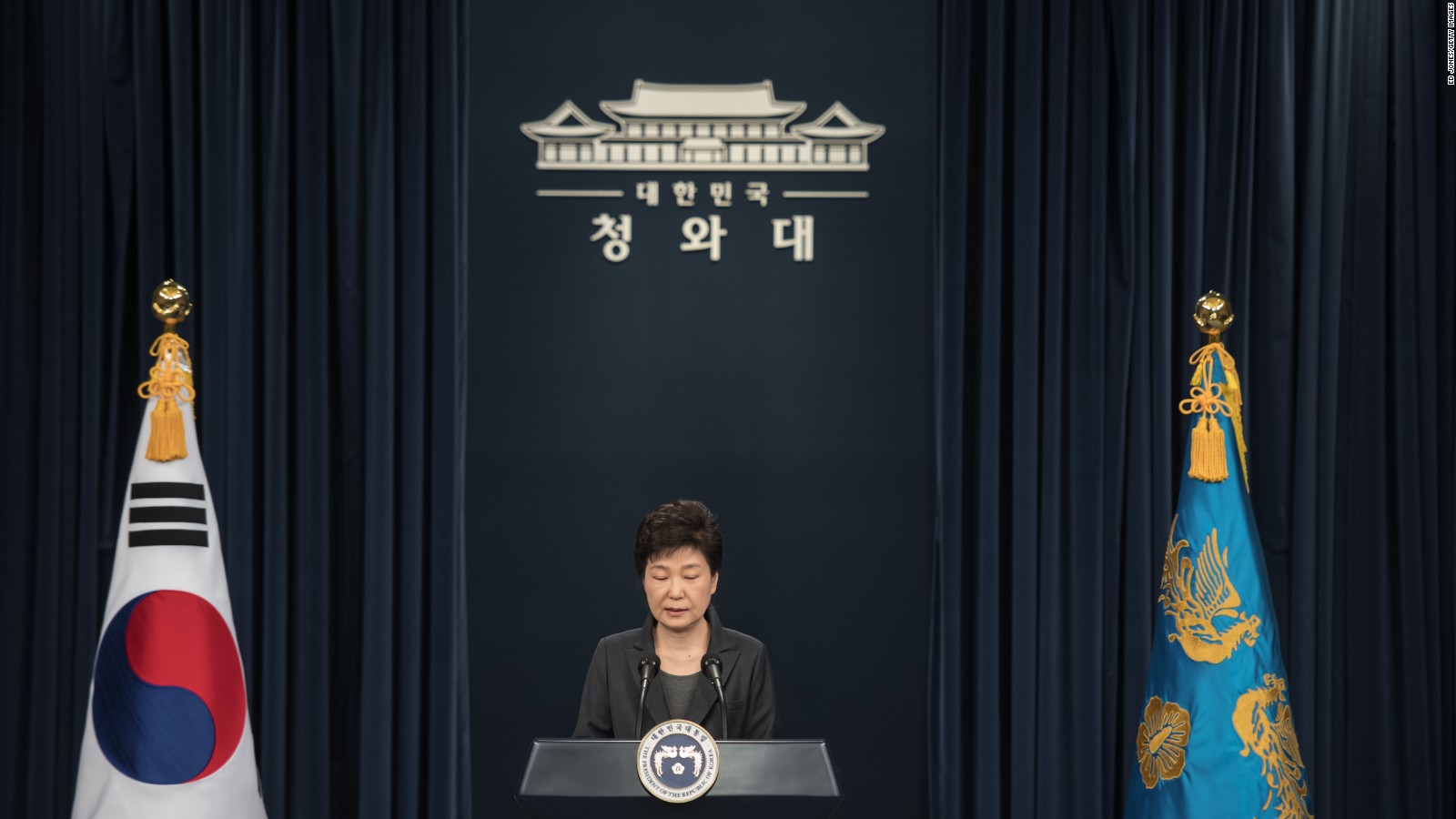5 reasons why South Korea's president is unlikely to quit
Story highlights
- Public outrage followed corruption scandal involving President Park's informal adviser
- Hundreds of thousands have called for Park to resign
(CNN)Pressure is building on
South Korean President Park Geun-hye
to stand down after revelations this
weekend she's been named
as a "suspect" by prosecutors in a corruption probe.
South Korean President Park Geun-hye
to stand down after revelations this
weekend she's been named
as a "suspect" by prosecutors in a corruption probe.
The president is accused of
colluding with three people
close to her office, and an
investigation will continue into her potential involvement in the unfolding scandal.
colluding with three people
close to her office, and an
investigation will continue into her potential involvement in the unfolding scandal.
Park's office said she doesn't have anything to answer for, and has
suggested the probe has been politically motivated.
suggested the probe has been politically motivated.
Mass protests demanding Park step down show no signs of waning.
However, despite the unrest, low approval ratings and the resignations
of several key aides, analysts say the president is unlikely to resign.
However, despite the unrest, low approval ratings and the resignations
of several key aides, analysts say the president is unlikely to resign.
Here's why.
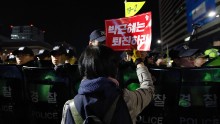
Photos:
Police estimated that around 12,000 demonstrators attended the evening protest, according to the country's semi-official Yonhap news agency.
Hide Caption
4 of 7
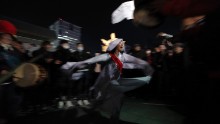
Photos:
A protester satirizes President Park's relationship with Choi Soon-Sil, wearing a costume of a shaman during the Saturday night protest.
Hide Caption
5 of 7
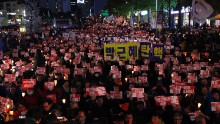
Photos:
"The Choi Soon-Sil crisis revealed that President Park Geun-Hye has neither the ability nor capacity to administer the government," protest leader Han Sun-bum said Saturday. "So we've gathered to demand Park resign, and we are going to keep protesting to urge for resignation until Park steps down."
Hide Caption
6 of 7
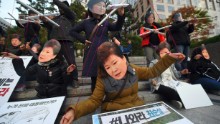
Photos:
Protesters wearing masks of South Korean President Park Geun-Hye and her confidante Choi Soon-Sil perform before a candlelit rally in central Seoul on Saturday.
Hide Caption
7 of 7

Photos:
Thousands of South Koreans took to Seoul's streets to demand President Park Geun-hye step down in the wake of allegations that Park let her friend, Choi Soon-Sil, interfere in important state affairs.
Hide Caption
1 of 7
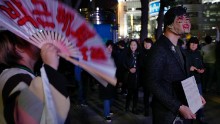
Photos:
A protester wearing a mask of Park Geun-Hye holds a placard saying "Why do you need Halloween fest? We can see all the horror in our lives," during the protest.
Hide Caption
2 of 7
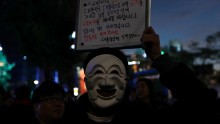
Photos:
A protester wearing a traditional Korean mask holds a placard saying "You Need to Resign Now" during the protest.
Hide Caption
3 of 7

Photos:
Police estimated that around 12,000 demonstrators attended the evening protest, according to the country's semi-official Yonhap news agency.
Hide Caption
4 of 7

Photos:
A protester satirizes President Park's relationship with Choi Soon-Sil, wearing a costume of a shaman during the Saturday night protest.
Hide Caption
5 of 7

Photos:
"The Choi Soon-Sil crisis revealed that President Park Geun-Hye has neither the ability nor capacity to administer the government," protest leader Han Sun-bum said Saturday. "So we've gathered to demand Park resign, and we are going to keep protesting to urge for resignation until Park steps down."
Hide Caption
6 of 7

Photos:
Protesters wearing masks of South Korean President Park Geun-Hye and her confidante Choi Soon-Sil perform before a candlelit rally in central Seoul on Saturday.
Hide Caption
7 of 7

Photos:
Thousands of South Koreans took to Seoul's streets to demand President Park Geun-hye step down in the wake of allegations that Park let her friend, Choi Soon-Sil, interfere in important state affairs.
Hide Caption
1 of 7

Photos:
A protester wearing a mask of Park Geun-Hye holds a placard saying "Why do you need Halloween fest? We can see all the horror in our lives," during the protest.
Hide Caption
2 of 7

Photos:
A protester wearing a traditional Korean mask holds a placard saying "You Need to Resign Now" during the protest.
Hide Caption
3 of 7

Photos:
Police estimated that around 12,000 demonstrators attended the evening protest, according to the country's semi-official Yonhap news agency.
Hide Caption
4 of 7
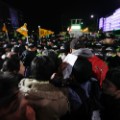
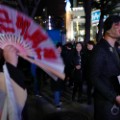
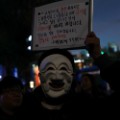
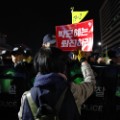
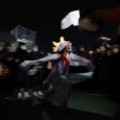
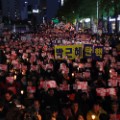
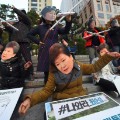
1. With the presidency comes immunity
While Park remains president she's immune from prosecution,
unless for insurrection or treason.
unless for insurrection or treason.
If she were to step down, she'd expose herself to potential arrest.
Over the weekend, South Korean prosecutors officially
indicted three people close to Park.
Over the weekend, South Korean prosecutors officially
indicted three people close to Park.
Her confidante Choi Soon-sil and former aide An Chong-bum
have been charged with abuse of power, fraud and coercion.
Another former aide, Chung Ho-sung, faces charges related to
leaking classified documents to Choi through email, phone and fax.
have been charged with abuse of power, fraud and coercion.
Another former aide, Chung Ho-sung, faces charges related to
leaking classified documents to Choi through email, phone and fax.
2. There's no one to take over
In South Korea, the prime ministerial post is largely ceremonial.
Though Park fired Hwang Kyo-ahn in early November,
he represented her at APEC in Peru as Park hasn't been able
to get her replacement approved by opposition parties.
Though Park fired Hwang Kyo-ahn in early November,
he represented her at APEC in Peru as Park hasn't been able
to get her replacement approved by opposition parties.
She nominated Kim Byong-joon, a professor at Seoul's Kookmin University,
as his replacement, but the National Assembly has not yet cleared Kim
to take the role.
as his replacement, but the National Assembly has not yet cleared Kim
to take the role.
Local media reports have suggested that United Nations Secretary-General Ban Ki-Moon -
- who ends his term at the UN in December 2016 -- could run for president.
- who ends his term at the UN in December 2016 -- could run for president.
Ban hasn't confirmed speculation that he'll run, though South Korean
news agency Yonhap reported in September 2016 that he rated wel
l in approval surveys.
news agency Yonhap reported in September 2016 that he rated wel
l in approval surveys.
However, John Delury, an expert on Korean affairs at Yonsei University,
told CNN that Ban's close association with Park's political party and his outsider status could be a disadvantage.
told CNN that Ban's close association with Park's political party and his outsider status could be a disadvantage.
3. No push from within her party to go
While calls for Park to resign have grown in the wake of her corruption scandal,
Paul Cha, an assistant professor specializing in modern Korean history
at the University of Hong Kong, told CNN, that there were still no concrete
reasons for Park to step down.
Paul Cha, an assistant professor specializing in modern Korean history
at the University of Hong Kong, told CNN, that there were still no concrete
reasons for Park to step down.
"There's been a tremendous domestic outcry and some leader
s of opposition political groups have called for her to step down.
But, in general, politically, the opposition seems more inclined to seek impeachment. Likewise, her own party has not placed pressure on Park to resign," pointed Cha.
s of opposition political groups have called for her to step down.
But, in general, politically, the opposition seems more inclined to seek impeachment. Likewise, her own party has not placed pressure on Park to resign," pointed Cha.
Cha explained that though media reports had portrayed Park
as weak-willed, she was not "running away" from public pressure by stepping down.
as weak-willed, she was not "running away" from public pressure by stepping down.
4. A weak opposition
While the public has vociferously called for Park to resign,
Dave Kang, a professor of international relations and S
outh Korea specialist at the University of Southern California,
told CNN that the main opposition parties had not yet backed
the public's claims.
Dave Kang, a professor of international relations and S
outh Korea specialist at the University of Southern California,
told CNN that the main opposition parties had not yet backed
the public's claims.
"Everyone knows that there will be a power vacuum if she resigns,
" said Kang, noting that political "chaos" was likely to ensue.
" said Kang, noting that political "chaos" was likely to ensue.
"That's why the opposition hasn't come out for her impeachment.
If Park steps down, elections will be called in 60 days and [the opposition]
aren't ready to rule."
If Park steps down, elections will be called in 60 days and [the opposition]
aren't ready to rule."
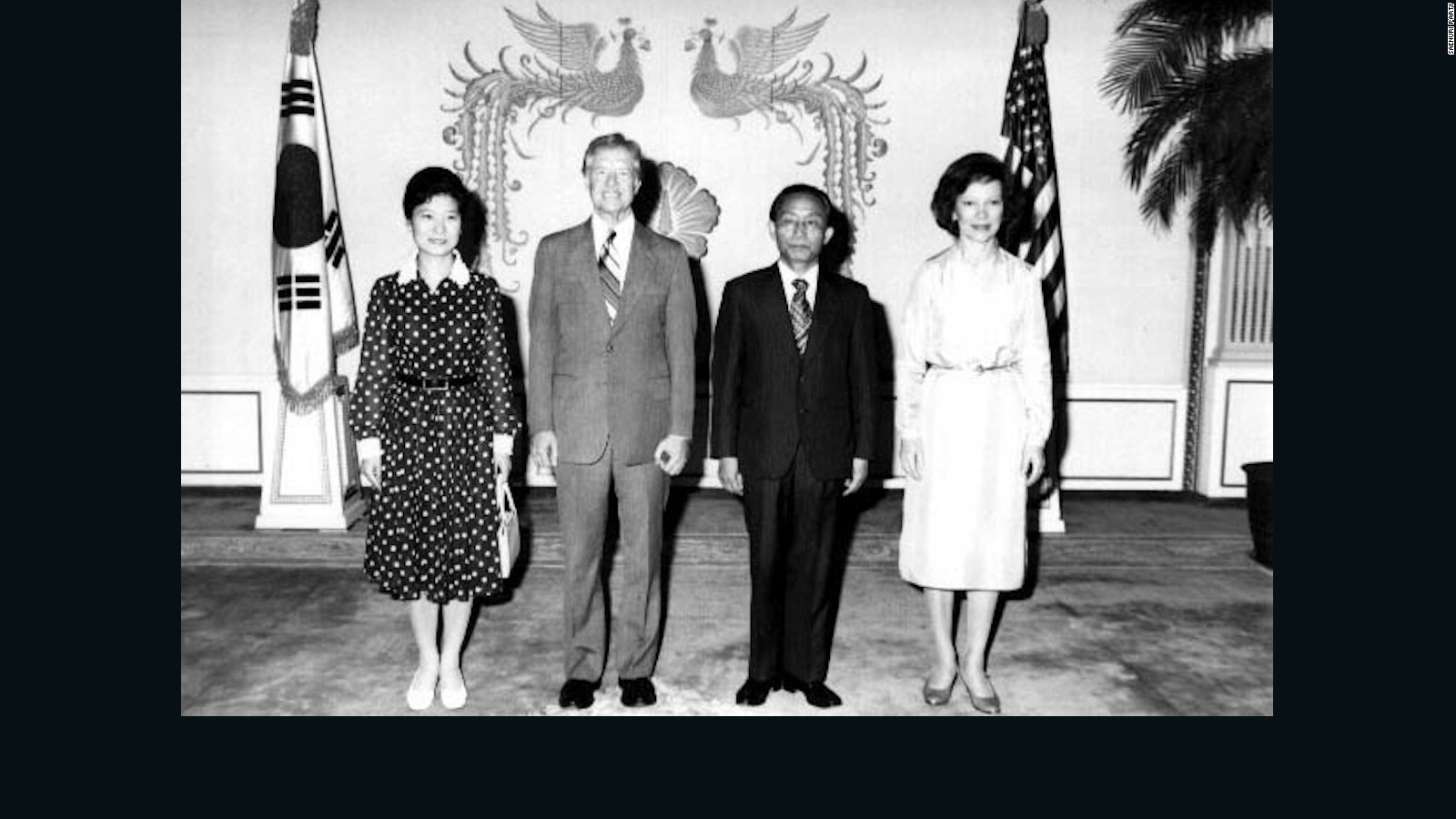
Park Geun-hye poses for a group photo with former U.S. president
Jimmy Carter in the Blue House.
Jimmy Carter in the Blue House.
5. Her pedigree
Park is the daughter of Park Chung-hee, the country's president from
1961 to 1979, who was assassinated by his own intelligence chief.
It came just five years after her mother's own mistaken assassination
-- the bullet was meant for former South Korean President Park Chung-hee.
1961 to 1979, who was assassinated by his own intelligence chief.
It came just five years after her mother's own mistaken assassination
-- the bullet was meant for former South Korean President Park Chung-hee.
The elder Park was seen by many as a dictator who violated
human rights and crushed dissent.
human rights and crushed dissent.
His daughter fought long and hard to get back into the
Blue House to become country's first female president.
She's unlikely to give it up without a fight.
Blue House to become country's first female president.
She's unlikely to give it up without a fight.
Correction: An earlier version of this article stated
that the prime ministerial role in South Korea was 'vacant.'
Technically this is not the case.
Though the current prime minister has been sacked,
he continues in the role as his replacement has not been approved.
that the prime ministerial role in South Korea was 'vacant.'
Technically this is not the case.
Though the current prime minister has been sacked,
he continues in the role as his replacement has not been approved.
CNN's Paula Hancocks contributed to this report.



